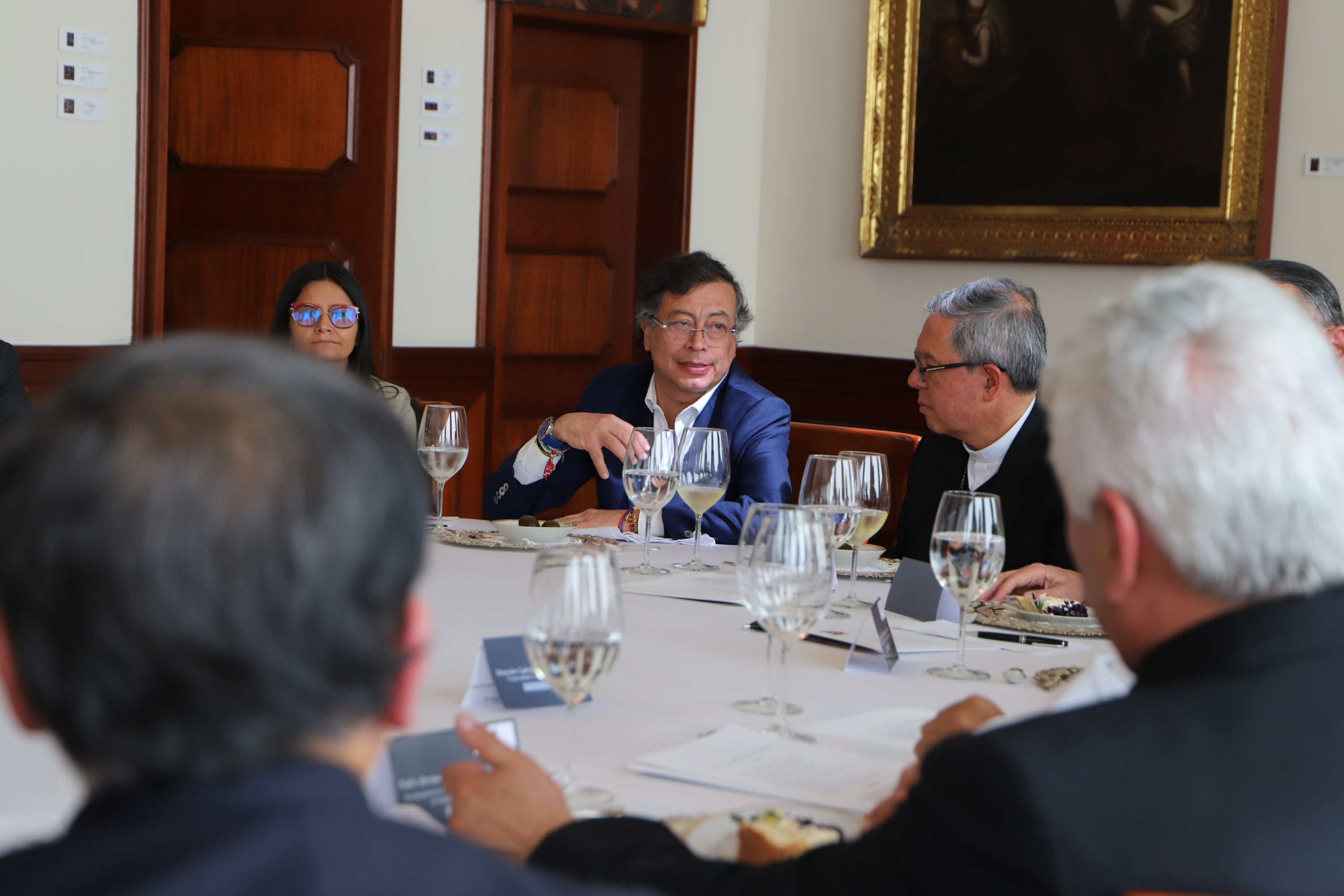President Petro, Congress, and the Cortes sign an agreement to reduce political tensions in the country.

An agreement to reduce tensions and violence in political debate was signed by the heads of the branches of government following a meeting convened by the Catholic Church yesterday afternoon. The commitment is an attempt to curb the contentiousness that erupted after the attack on opposition senator Miguel Uribe (Democratic Center).
"We commit together to listen to, value, and respect one another in brotherhood," was the main point of the agreement, which doesn't extend to more than a few paragraphs.
The meeting at the Archbishop's Palace lasted just over two hours and was attended by most representatives of the branches of government. The president of the Council of State, Luis Alberto Álvarez Parra, who was attending an event in Manizales, and the prosecutor, Luz Adriana Camargo, who was working on an international agenda, apologized for their absence.
Present at the luncheon were President Gustavo Petro; Senator Efraín Cepeda, President of Congress; Representative Jaime Raúl Salamanca, Speaker of the House; Judge Jorge Enrique Ibáñez Najar, President of the Constitutional Court; and Judge Octavio Augusto Tejeiro Duque, President of the Supreme Court of Justice.
Also at the table were Attorney General Gregorio Eljach Pacheco, Comptroller General Carlos Hernán Rodríguez, Ombudsman Iris Marín Ortiz, Registrar Hernán Penagos Giraldo, and the director of the National Human Rights Commission (DAPRE), Angie Lizeth Rodríguez Fajardo. The meeting was chaired by Cardinal Luis José Rueda Aparicio, Archbishop of Bogotá and Primate of Colombia; Monsignor Francisco Javier Múnera Correa, Archbishop of Cartagena and President of the Colombian Episcopal Conference; and Father Hermann Rodríguez Osorio, Provincial of the Society of Jesus and representative of the Conference of Religious of Colombia.
According to those present, the meeting was conducted with complete cordiality: "We were pleasantly surprised because the atmosphere was very friendly. It allowed us to experience a different atmosphere, and that can make a difference," said Monsignor Francisco Javier Múnera, president of the Episcopal Conference. He also added that "all the guests signed with great commitment and responsibility."
At the end, Attorney General Gregorio Eljach also spoke, also giving a positive report. "It's positive. It gives peace of mind and calm to dismantle the word, as the statement says. That's always positive and welcome," said the head of the Public Ministry.
According to Eljach, the event served as a platform for "reflection on the country's situation and the need for dialogue to build consensus."
The agreement that was reached "In a global, national, and local context of profound tensions, contradictions, and transformations, as citizens, servants, and representatives of the Colombian State Institutions, we commit ourselves together and invite the entire country to listen to, value, and respect one another as brothers and sisters; to disarm and harmonize our words; and to reject all forms of violence as a way of resolving political and social conflicts," reads the central theme of the signed text.
The document also included a space to pray for the health of Senator Miguel Uribe, who is in critical condition, and for the rest of the victims of recent violence. Finally, the meeting concluded with a request that these types of events be replicated in other venues, including the media. "We call for keeping hope alive in our country and invite these types of meetings to be replicated wherever necessary," reads the closing of the document signed by all those present.
Following the signing, representatives of the Catholic Church presented the conclusions in a brief press conference. Monsignor Héctor Fabio Henao, responsible for church-state relations and a participant in several peace talks, highlighted the role of dialogue as a way to de-escalate violence: "Dialogues have a humanitarian purpose and are a necessary element for advancing social dialogue. We call for this exercise to be carried out in the territories and replicated throughout the nation."
In that sense, he added: "A very important key in all of this is to realize that violence is not the instrument used to debate ideas in a democracy. It's the word that must prevail."
"The value of this first meeting and first step remained in the air. There is a commitment to continue working. It is a process and a journey; it is a fundamental step toward achieving a pedagogy of words, listening, dialogue, and respect. It is a fundamental step toward creating new attitudes. We are called to the entire country and all institutions. To light a small flame to show paths. That was the intention, and it has been well received. As a church, we are not seeking a leading role, but rather to embrace the cries of the country," commented the church representative at the event.
According to the meeting's spokespersons, it was discussed that this space should serve as a platform for initial reflection on how to implement the commitments signed. "Each entity has its responsibility. Everyone is clear about respect and building and strengthening institutionality. Everyone is a servant of the Magna Carta," stated Monsignor Francisco Múnera, president of the Episcopal Conference.
However, he acknowledged that there are no commitments regarding specific actions. "One of the purposes of the meeting was to be the first step, but subsequent processes may follow. We weren't going to enter into broad definitions (...) Our meeting didn't focus on the technical aspect," he stated.
This was the invitation "As high-ranking officials of the Colombian State Institutions, we invite the entire country to value and respect one another as brothers and sisters, to disarm and harmonize our words, and to reject all forms of violence as a way of resolving political and social conflicts," stated the call issued by the Episcopate for Monday afternoon.

The Church is preparing a summit with institutions to seek crisis-related agreements. Photo: Instagram @gustavopetrourrego
The meeting included a luncheon during which a document was discussed calling for peace in the country. "Together, we will build an invitation to the country to commit to disarming and harmonizing our words, and rejecting violence," the invitation states.
Cepeda himself spoke earlier at the meeting. He welcomed the Church's invitation and stated that he would attend as the head of Congress.

President Petro attends the meeting. Photo: Episcopal Conference
eltiempo





